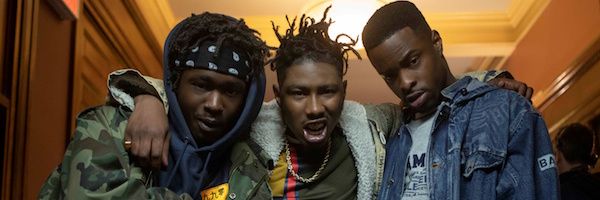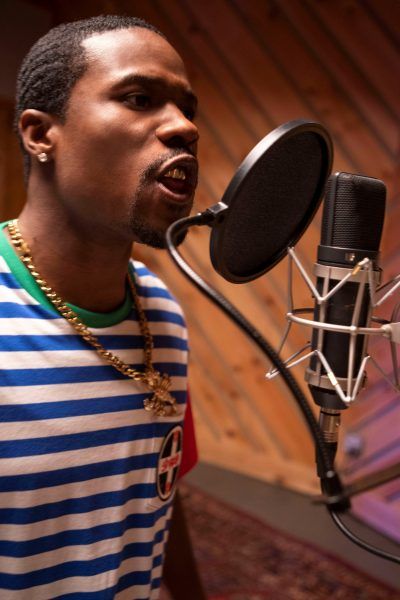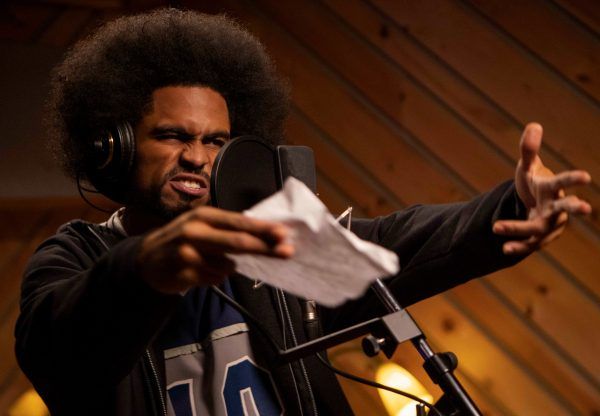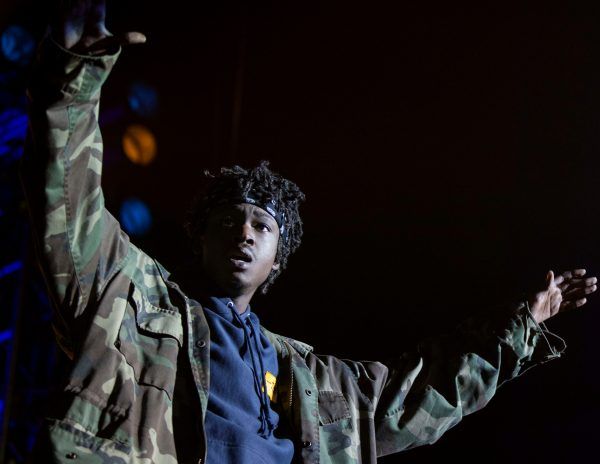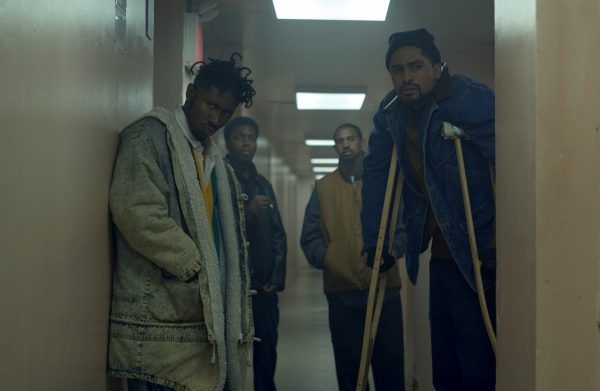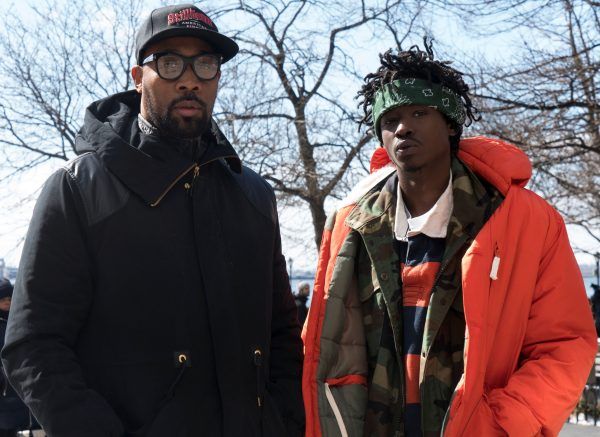Created and written by Alex Tse and The RZA, and based on one of the most influential groups in hip-hop history, Wu-Tang: An American Saga tracks their formation and follows the vision that Bobby Diggs (Ashton Sanders), aka The RZA, had to unite a dozen young black men, in the early ‘90s at the height of the crack epidemic in New York City. Torn between music and crime, the members of Wu-Tang grew to become as much of a force individually as they were together, reaching a height of success that cemented their place in music history forever.
While at the Hulu portion of the Television Critics Association Press Tour, Collider got the opportunity to sit down and chat with executive producers Alex Tse and The RZA about how this TV series came about, talking to the other Wu-Tang guys before going into production, deciding where to deviate from fact and how much to fictionalize the story, playing with time in the storytelling, finding the right actors to play these larger than life personalities, what they hope audiences will take away from watching this show, and the impact that Wu-Tang Clan has had on music and the culture today.
Collider: This is such a fascinating story that it’s easy to see why it would make for great storytelling. Did you talk to the other Wu-Tang guys before doing this, or were you going to make this, no matter what?
RZA: Actually, I’m the type of person that will decide to do something, either way, but I talked to the guys. Alex took a long time to crack the story. I feel like that took a year, before we even started. That was before we even had a treatment. But during the process, we had this weekly Wu Wednesday call, and I would bring up what I was doing and what I was striving for. I had a plan. I can say it now, but I couldn’t say it then. I had what I would call a five-year plan. When I do my five-year plans, the first one was to come together, put out 36 Chambers, and in five years, have it be number one, which we did. I’m not going to tell you this plan, but this is part of a five-year plan, that started with the documentary (Wu-Tang Clan: Of Mics and Men) and now this series. I informed the guys that this is where our story and our art is at, an that this is the medium for it to travel through, and that they should trust me and come on board. That was the hard part. But eventually, we got them on board.
Was anyone most reluctant?
RZA: The Wu is the Wu. One thing about this show that I love is that you sit there and watch the actors portray these roles, and you actually remember the energy and the moment of the situation or the relationship. There’s a scene were Dave East is playing Shotgun, who’s Method Man, and he’s at Bobby’s house and he’s rapping a demo. But then, Raekwon, played by Shameik Moore, comes over, and he’s not interested in his demo, his style or his swag. He’s confronts him and says, “Nah, you’re doing that bitch shit.” That confrontation is known amongst us. When Method Man blew up, we called him the Michael Jackson of rap, and he hated that. That was part of some of the members picking on him. When you watch the show and you see that same dynamic of energy that existed from youth, and carried into adulthood, there’s something cool about that. As far as different guys being reluctant about this, their personalities are their personalities.
ALEX TSE: It’s a challenge, especially in hip-hop, when you need to be vulnerable. In order to have a show, you need to show your vulnerabilities and be willing to peak behind the curtains, and that wouldn’t be easy for anybody. So, there were a lot of challenges with that.
Was it challenging to tell a story that involves so many people, who each have such distinct personalities, and figure out which threads to follow, at any given moment?
TSE: We’re calling it historical fiction. It’s grounded and based in a lot of truth. I would challenge you to find a biopic that doesn’t take license. The whole point is that, as long as you’re being spiritually true, that’s the most important thing.
How did you decide where you would deviate and where you wouldn’t?
TSE: It started in the foundation, when we first met and talked about, is there a show here? Once he started telling me some stuff, I knew that for there to be an actual television series and not just a movie, it had to be based in truth. Within the truth itself, you could deviate. Knowing that there was architecture working off of the bones of the truth, then we could fill it out with different little embellishments. But there had to be a TV series that was based in history, for us to go forward, in my opinion.
RZA: The famous director who did Serpico and Dog Day Afternoon, Sidney Lumet, wrote in his book, that I read about five years ago, that film is the medium where you can suspend and play with time. What a film does, more than any other medium, is that it plays with time. So, understanding that principle, after Alex was my therapist for a couple of years and I poured out my brain to him, with his very unique way of listening, when we starting writing it, we had to figure out how to frame the reality, and the best way to do that was to play with time. So, you meet the characters in a pivotal moment in time, with something that happened that we don’t talk about with the rest of the world. To talk about that was not easy ‘cause there were a lot of people that we had to talk about that with, but it opened up the world. And then, when you meet Ashton [Sanders], you meet him as Bobby. Throughout the course of the season, Bobby has to make it to become RZA. Since we could play with time, we can actually see Bobby making this beats, and we can go flashback to what Bobby went through, in his earlier life. And you can see Dennis in a situation that’s crazy because it opens up on a fateful night, but then we can see, later on in the series, what happened two weeks before that because we can play with time. That’s been the biggest gift to our creativity. Even when it seems like some fiction is slipping in, it’s actually not that much fiction slipping in. It’s just the timeline that changes a little.
RZA, what’s it like for you to go back and revisit all of this? Did it give you a different perspective?
RZA: I’m able to approach it as a filmmaker and a producer. Early on, in one of our meetings, Alex pointed out that Bobby has the ability to look at himself in the third person, and maybe he’s right. As a creator, I’m able to separate from it. But during the process, we had to go back to the address of 88 Laurel, where my development years, as a teenager, happened with my family. We went to the real house, and we walked through that house. My little brother was with me, who’s a man now, and we both were like, “Wow, we lived here.” There’s a Spanish family that lives there now, and they had great hospitality and let us use the use the place. And then, our production designer, Scott Murphy, scaled it and built it over on the stage for the interiors. We called my sister for the wallpaper. She had an old picture of that and how the floor was, and he had to recreate that. That became pretty surreal. One day on set, during Episode 7, I popped up and I had my daughter, who had never stepped foot in that house before ‘cause she wasn’t born and has only see the RZA side of life, and she was able to get a sense of where I started, and that was beautiful thing, as well.
Alex, what’s the collaborative process like for you, when you’re working with someone who has that history to bring to the table but who also has a filmmaker perspective?
TSE: I can’t begin to tell you how valuable that is. He understands the need for story. When it’s your life, you can get caught up in reality having to be reality, but the bottom line is that sometimes that’s just not gonna work for an episode or a season of television. But we never really had to have that discussion because he’s an artist and filmmaker and understands that. He has a really incredible ability to have an objectivity of his own life. Not everyone’s willing to be vulnerable and to put this out in the world. Even in some cases, he probably makes himself more vulnerable than what reality was. So, in that regard, it was incredibly invaluable, not just personally, but because of the skill set that he as. I really don’t know how it would have worked without that.
RZA: Being creative is one thing, but if I can say something about myself, in a vain way, when something doesn’t work and we’re like, “We know what happened, but that can’t happen, and we got to get over this wall, so how are we gonna get over this wall?,” fortunately, I’m a mature man who’s had a lot of living, and there’s a day that we can pull out where something similar happened. So, there’s a scene in Episode 2 where Shameik’s character, Raekwon, on is really barking on Bobby. It’s a great fucking scene, but my wife watched it and felt a little offended that I was in such a vulnerable position to him. But I’ve been in a vulnerable position with him before. Not maybe during the period of me being The RZA on the uprise, but when he was evolving to he thought he was, and he challenged me before. That happened in real life. Did it happen, at that time? No. But we were trying to get over that hump, and there was a time that actually happened. That was another great thing that helped us. We’d stop and think about things and talk about things, to see if we could find something from reality. The secret of writing is that there’s always a spoonful of reality, and the secret of making movies is that there’s always a spoonful of magic, also . You’ve gotta put that together. Tea is better when you put that sugar in it.
Was it difficult to find the actors to take on these characters, who are not only iconic as a group, but who are also iconic as individuals?
TSE: It was really hard. We had a great casting team, with Kim Coleman, and we just had to search long and hard. It was hard because the truth of the matter is that everyone in Wu-Tang are all stars, in their own right. It’s not easy to find those qualities in some characters that would be supporting, in the beginning. You can’t just start the show with 10 people. That was really, really hard, and we really had to look. In some cases, we had to bring people in and give them direction to see what would happen.
RZA: It was like churning butter. We had to keep churning it. Out of all things, that got to the wire. We had a schedule already, but we hadn’t found our guy. We just kept digging. We were blessed with a strong team of creatives. We had a strong team in New York, with the film crew and production designers, and all of that, and a lot of them knew Wu-Tang. Since they knew it, they were able to give elements to the characters that they knew. Our costume designer, Marci Rodgers, lives for the ‘90s, so she was able to give an actor a hat that would bring the character out of him. So, we had a great cast, but a great cast needs the other great elements around it to make them feel like the character. As an actor, if you go into the chair and the make-up person doesn’t bring you back to that character that you’re playing, then you don’t have the same spirit that you need. So, good make-up people and good hair people are important, as well.
RZA, you talked about the sets being surreal, but was it also surreal to watch an actor playing you?
RZA: I would go back to my wife for reference and she’d be like, “How did he get your walk?,” and I don’t walk like that now. Ashton might’ve watched videotapes of me. He picked up habits that I used to have. He’d do certain things. I took him to the studio a few times, and he did some things where, if I wasn’t in Hollywood making films, would be weird. I was like, “Listen, man, you’ve just gotta feel the groove and the beat. You know what I’m saying?” And he’d say, “You know what I’m saying?” He kept emulating me. So then, I started showing him stuff, and he’s watching me. So, why did we choose a guy like that? It was his eyes. Bobby has to evolve to become The RZA. It was all in the eyes, and he had it in the eyes.
Have you always been as focused and determined as you sound, or is that something that evolved in you?
RZA: I don’t know. My uncle was really a blessing. Our show don’t touch on it, but in reality, I only spent three and a half years with him, and then he passed away. He was a young man. He passed away at maybe 45, or 50 years old, at most, but he worked hard and studied. He had 600 acres of land, where he had tobacco, peanuts and animals. He was a practicing doctor with his own clinic. He just was constantly working. He took care of the whole family. His sisters had houses. My mother is the daughter of his brother, who passed away when my mother was a baby. So, when the problem hit my mother, and she had these children, he raised his hand and said, “Send ‘em to me,” knowing that it was his brother’s daughter’s children. That’s pretty unique. And he didn’t know that he only had a little bit of time left. Who knows that? But he had less than five years left on his life, and gave us three and a half of those, which is crazy. But anyway, you asked me about being driven, and with him as an example of a father figure, went a long way with me. I would have been in New York, smoking blunts and saying, “Fuck this shit, son,” without that. A lot of people get high, but you don’t get high unless you’ve got something to celebrate. Otherwise, it’s a fuckin’ waste of time.
If you went back and told that kid that we see in the show, that he would be where you are now, that he would believe you, or would he have thought you were insane?
RZA: I don’t know. I just love the road that the character travels. We’ve all had our experimentations with things. Most people have met me as The RZA, so they don’t know all of the pitfalls that I went through, getting there, and watching the character go through that is exciting. If somebody was to go back and tell any of us, “Your whole head will be grey,” you wouldn’t believe it. You’d be like, “Man, get the fuck outta here!” And in my community, I’m not shy saying that I didn’t think I was gonna live past 25, when I was 18, because that was the statistic. I was like, “I made 25?” That’s almost a prayer, growing up during my period in New York City.
Alex, in the process of making this, how many hours did you spend listening to the music?
TSE: That was growing up, from high school through college. I did more hours, before I ever met him. I probably did less, after I met him. I did go back and have a few albums in rotation, once we started talking, but the reason why we were put together was because I was such a fan. In high school, I was a hip-hop nerd.
How did it change your perspective, to dive so deep into all things Wu-Tang?
TSE: I was the dude who would read all of the liner notes, so I knew who mixed some of the songs, where all of the samples came from, and all of that stuff. I thought I knew what a lot of the lyrics meant, but there were some cases where I had no fuckin’ idea. He’d be like, “No, that line means this.” And I’d be like, “Oh, shit, now I’ve gotta fuckin’ go back and listen to that song ‘cause I’ve been listening to the song wrong, for 10 years now.” I also watch a lot of interviews, so I’d seen The RZA, but then when you get to the story and you learn what it all means, that’s a show. I thought I knew a lot about Wu-Tang, but I didn’t know shit. It’s made me like Wu-Tang even more because it’s a fascinating story. It was really cool for me, not just as a fan of the music, but in life, anytime you think you know something, just from reading and watching interviews and listening to music, from a teenager to an adult, you realize that there’s so much you don’t know. Whenever you encounter that in life, at all, over something that you find interesting, it’s always incredibly exciting.
Is that what you hope people take away from this show?
RZA: Yeah. One of my goals is to entertain and inspire, at the same time. I want you to be entertained by the show, but I also want people to be inspired, especially young people. Being young is the shortest part of your life, but if you don’t make it through that journey, life is fucked up. It’s a very stagnant life, that so many people have. Following the journey of these characters, hopefully it will inspire you to change your shirt or cut your hair. My goal is to entertain you and inspire you, at the same time.
Could you ever have imagined that, all of these years later, people would still be talking about the music of Wu-Tang Clan and the impact that it’s had?
TSE: You can go to Urban Outfitters right now and get a t-shirt.
RZA: It’s crazy. I think that inspiration is in the music. I think that’s why you can go get a t-shirt. Discovery is a part of life. We’re always looking for some answers. If you look at Bob Marley, those songs, at the right time in your life, can mean everything to you. If you look at Nirvana, at the right time in your life, those songs can mean everything to you. The capturing of youth through the music is what we did, and that’s why young people keep rediscovering it, and the interpretation is still vast. Now, we get to give you a visual interpretation. A picture can say a thousand words, so at 30 frames per second, imagine how many words we can put inside everybody’s head. It ain’t good to hope in business, but we hope that this show really resonates with the audience, and that they get a similar inspiration that the music gave them, and that they travel with us on this journey.
Wu-Tang: An American Saga is available to stream on Hulu, starting on September 4th.

